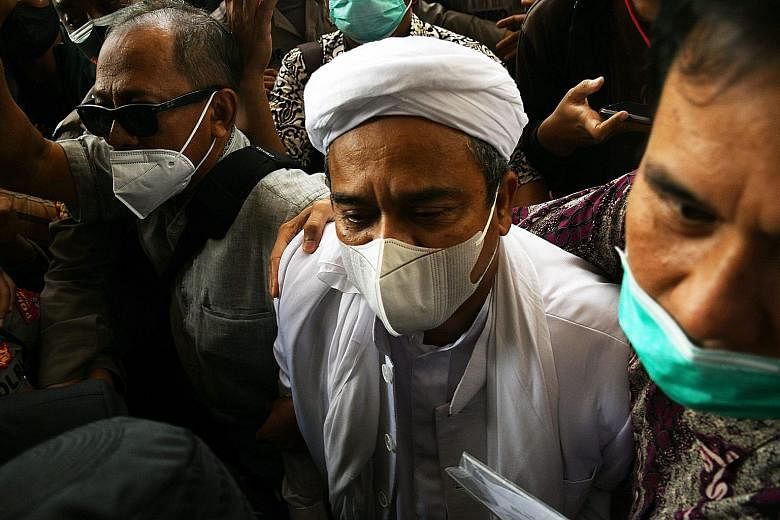The Indonesian government has outlawed the hardline Islamic Defenders Front (FPI) group notorious for its raids on bars and hotels during the Ramadan fasting month and attacks on entertainment venues.
Indonesia's chief security minister Mahfud MD said yesterday that the controversial group has been officially outlawed with immediate effect.
The Coordinating Political, Legal and Security Minister said in a live-streamed news conference: "The government has banned FPI activities and will halt any activities held by FPI because it no longer has legal standing both as a mass organisation and a regular organisation.
"If an organisation acts on behalf of FPI, it must be considered as non-existent and rejected due to the absence of the legal standing starting from today."
The FPI has been automatically disbanded after its permit expired on June 20 last year but it has continued to carry out violent acts and other controversial activities.
Apart from its so-called "sweeping operations" against bars, brothels and entertainment venues, FPI members have also carried out violent assaults against minorities, such as Ahmadiyahs and Christians. Though controversial, the group and its leader Rizieq Shihab are influential among conservative Muslims in Indonesia.
Newly appointed Deputy Law and Human Rights Minister Edward Omar Sharif Hiariej yesterday called on the public not to get involved in any FPI activities and the use of its attributes and symbols.
Mr Edward noted that 35 FPI members and former members had been involved in terrorism, of whom 29 were found guilty of committing the crime. Apart from them, another 206 had carried out other criminal actions, and 100 of them were punished, he added.
A senior government official said this month that former members of the disbanded Muslim hardline group Hizbut Tahrir Indonesia (HTI) in West Java are being wooed to join the FPI, and attend army-like training for young recruits to become paramilitary troops.
The HTI, which called for strict Islamic laws in Indonesia and wanted to unify all Muslims into a caliphate, was outlawed in mid-2017.
FPI leader Rizieq, 55, returned to Indonesia last month after spending more than three years in Saudi Arabia in self-exile, with thousands of his supporters thronging Indonesia's main airport in Tangerang, Banten province, to welcome him on his return.
-
Five things about FPI
-
• The Islamic Defenders Front (FPI) was founded on Aug 17, 1998, just a few months after the fall of strongman Suharto, and sought to enforce strict Islamic law. Starting as a civil group with alleged backing from the police and military on its anti-vice operations, it has gained popularity among conservative Muslims, claiming five million members.
• It is led by firebrand preacher Rizieq Shihab, 55, who returned to Indonesia on Nov 10 after more than three years of self-exile in Saudi Arabia following two police investigations. He was arrested by the police on Dec 12 and is under investigation for an alleged breach of coronavirus restrictions in crowd-attracting events in and outside Jakarta soon after his return, including his daughter's wedding. He had been embroiled in a number of past criminal investigations, and imprisoned at least twice.
• The group is notorious for raiding bars, brothels and other entertainment venues they condemn as "immoral places" as well as attacking religious minorities, including Ahmadiyahs and Christians, with machetes and swords.
• Six of Rizieq's bodyguards were killed on Dec 7 in a highway shoot-out with police as they accompanied him in a convoy of vehicles. Police say those killed were carrying firearms, including pistols, a claim rejected by the FPI, which described the shootings as "extra-judicial killings".
• The FPI in 2016 organised mass street rallies against then Jakarta Governor Basuki Tjahaja Purnama for blasphemy, flexing its political muscle. Rizieq openly supported Mr Prabowo Subianto, the only contender against President Joko Widodo in the 2019 presidential election and who is now Defence Minister.
Police earlier this month killed six of his bodyguards as they followed Rizieq in a vehicle convoy. Police said these men illegally possessed firearms and tried to attack the officers outside Jakarta on Dec 7.
Rizieq left for Saudi Arabia in 2017 after the authorities started investigations into his insult of Indonesia's secular state ideology, Pancasila, and breaching pornography laws, after a purported steamy exchange with a supporter that included naked images of a woman circulated online. Both investigations were dropped a year later.
The public has long called for the disbandment of the FPI through petitions, citing the division in society it has caused and religious related violence, among other reasons.
One petition in May last year was signed by more than 400,000 people requesting the Home Ministry not to extend the permit of the organisation, which expired on June 20 last year.
The FPI was founded in 1998 after the fall of Indonesia's 32-year dictatorship under Suharto.
In 2016, the firebrand preacher Rizieq led a massive sectarian movement against then Jakarta Governor Basuki Tjahaja Purnama, popularly known as Ahok.
Ahok, a Chinese-Christian politician, lost in the 2017 gubernatorial election against Dr Anies Baswedan, the current Jakarta governor, and was later convicted of blasphemy against Islam, resulting in a two-year jail term.

